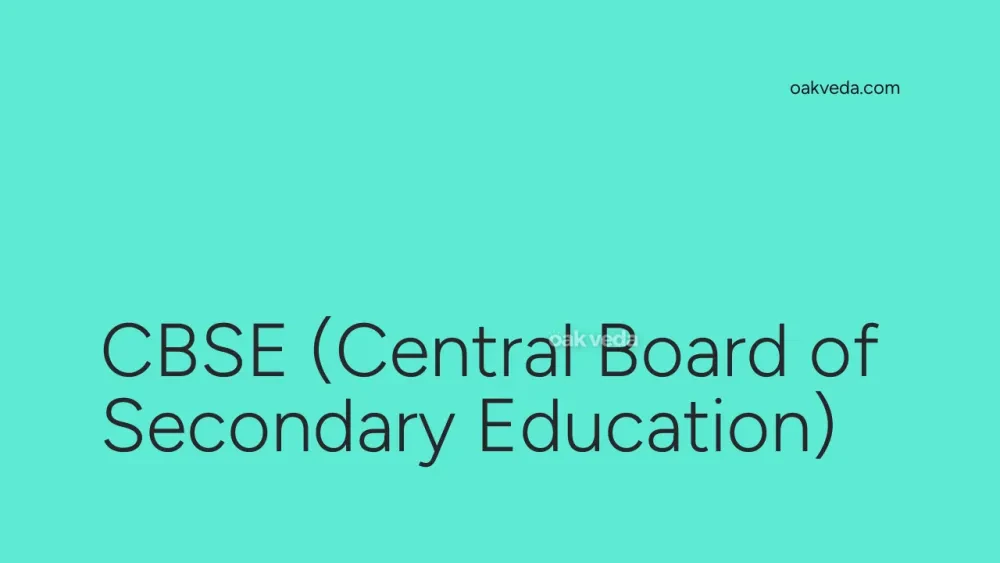
What is the Full Form of CBSE?
The full form of CBSE is Central Board of Secondary Education. This national-level education board plays a crucial role in shaping India's educational landscape, overseeing both private and public schools across the country and in several international locations.
What is Central Board of Secondary Education?
The Central Board of Secondary Education, commonly known as CBSE, is a prestigious educational board in India. Established by the Indian government, CBSE is responsible for developing and maintaining educational standards for thousands of affiliated schools. It operates under the Union Government of India and is headquartered in New Delhi.
Origin and Development of Central Board of Secondary Education
The roots of CBSE can be traced back to 1921 when the first educational board in India, the Uttar Pradesh Board of High School and Intermediate Education, was established. This board initially covered regions including Rajputana, Central India, and Gwalior. In 1929, the Indian government took a significant step by creating a joint board called the Board of High School and Intermediate Education.
The CBSE as we know it today evolved from these early foundations. Over the years, it has grown to become one of the most recognized and respected educational boards in India, with its influence extending beyond national borders.
How does Central Board of Secondary Education work?
CBSE functions as a comprehensive educational system, overseeing various aspects of school education:
- Curriculum Development: CBSE designs and updates curricula for affiliated schools, ensuring they meet national educational standards.
- Examination Conduction: The board conducts annual examinations for 10th and 12th-grade students, known as AISSE and AISSCE respectively.
- School Affiliation: CBSE affiliates schools that meet its stringent criteria, ensuring quality education across its network.
- Teacher Training: The board organizes capacity development activities to enhance teachers' skills and competencies.
- Policy Implementation: CBSE implements educational policies in line with national goals and objectives.
Functions of Central Board of Secondary Education
The CBSE serves multiple functions in the Indian education system:
- Standardization: It sets and maintains educational standards across affiliated schools.
- Assessment: Conducts various examinations, including board exams and competitive entrance tests.
- Curriculum Design: Develops and updates curricula to keep pace with global educational trends.
- Quality Assurance: Ensures affiliated schools maintain high-quality educational practices.
- Teacher Certification: Conducts the Central Teacher Eligibility Test (CTET) for teacher recruitment.
- International Outreach: Manages CBSE-affiliated schools in 28 countries, promoting Indian education globally.
Applications of Central Board of Secondary Education
CBSE's applications extend beyond regular schooling:
- Competitive Exam Preparation: CBSE syllabus forms the basis for many competitive exams, including JEE and NEET.
- Higher Education Foundation: Provides a strong foundation for students pursuing higher education in India and abroad.
- Skill Development: Incorporates vocational courses and life skills in its curriculum.
- National Integration: Promotes a unified educational approach across diverse Indian states.
- International Education: Facilitates Indian education for NRI and foreign students through its international affiliations.
Features of Central Board of Secondary Education
Key features that distinguish CBSE include:
- Bilingual Instruction: Offers education in both Hindi and English.
- Comprehensive Curriculum: Covers a wide range of subjects, balancing academics with co-curricular activities.
- Stress-free Learning: Emphasizes child-centered, comprehensive learning approaches.
- Regular Updates: Continuously revises curricula and teaching methodologies.
- Nationwide Network: Operates through multiple regional offices across India.
- Digital Integration: Incorporates modern technology in teaching and administrative processes.
Benefits of Central Board of Secondary Education
Students and schools affiliated with CBSE enjoy several advantages:
- Simplified Curriculum: Compared to some state boards, CBSE offers a more straightforward and manageable syllabus.
- Ease of School Transfer: The widespread presence of CBSE schools facilitates easier inter-state transfers for students.
- Competitive Exam Readiness: CBSE syllabus aligns well with various national-level competitive exams.
- Holistic Development: Encourages participation in both curricular and co-curricular activities.
- English Proficiency: CBSE students often demonstrate strong English language skills.
- Quality Assurance: Strict guidelines ensure high standards of education across affiliated schools.
Limitations or Challenges of Central Board of Secondary Education
Despite its many strengths, CBSE faces certain challenges:
- Uniform Approach: The standardized curriculum may not always cater to regional diversity and local needs.
- Exam Pressure: The focus on board exams can create stress for students.
- Resource Disparities: Maintaining uniform standards across diverse socio-economic contexts can be challenging.
- Rapid Changes: Frequent updates to curricula and policies may be difficult for some schools to implement quickly.
- Language Barriers: The emphasis on English and Hindi may pose challenges in non-Hindi speaking regions.
Future Developments in Central Board of Secondary Education
CBSE continues to evolve, with several future developments on the horizon:
- Digital Transformation: Increasing integration of technology in teaching and assessment methods.
- Skill-based Learning: Greater emphasis on practical skills and vocational training.
- Personalized Learning: Exploring adaptive learning technologies to cater to individual student needs.
- Global Collaborations: Expanding international partnerships to enhance global educational standards.
- Sustainable Education: Incorporating environmental awareness and sustainability into the curriculum.
FAQs on CBSE Full Form
-
What is the official website of CBSE? The official website of CBSE is http://cbse.nic.in/
-
How many schools are affiliated with CBSE? There are approximately more than 27,000 CBSE-affiliated schools in India and over 220 in 28 international countries.
-
What is NET conducted by CBSE? NET (National Eligibility Test) is an exam conducted by CBSE for the recruitment of professors in colleges and universities.
-
What are AISSE and AISSCE? AISSE (All India Secondary School Examination) is for 10th-grade students, while AISSCE (All India Senior School Certificate Examination) is for 12th-grade students.
-
Does CBSE conduct any other competitive exams? Yes, CBSE conducts JEE (Joint Entrance Examination) for engineering admissions and NEET (National Eligibility cum Entrance Test) for medical college admissions.
You may be interested in:

